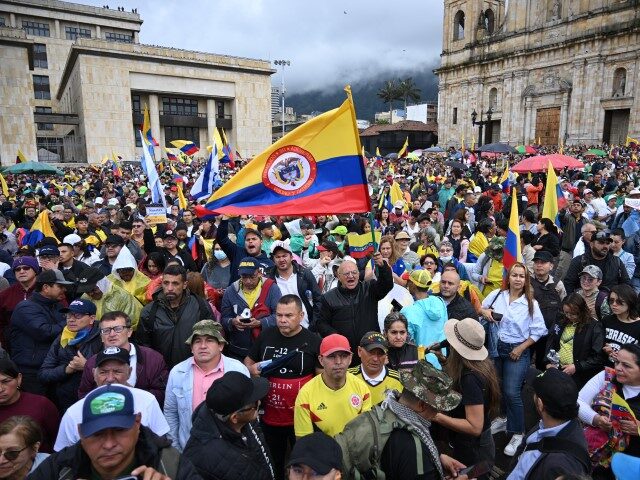Roughly half a million Colombians took to the streets of the nation’s main cities on Sunday in what is considered the largest peaceful protest yet against the nation’s far-left President Gustavo Petro.
While Petro himself has publicly downplayed Sunday’s attendance numbers, claiming that only some 250,000 participated nationwide, local security authorities have estimated that roughly 350,000 citizens flocked to the streets of the city of Medellín alone, and an additional 180,000 participated in the capital city of Bogotá. Peaceful demonstrations were reported in other Colombian cities such as Cali, Barranquilla, Cartagena, and Bucaramanga.
Local opposition politicians have declared Sunday’s protests larger than the historic peaceful protest against the Marxist Revolutionary Armed Forces of Colombia (FARC) terrorist organization in 2008.
Sunday’s event, nicknamed the “March of the White Coats,” featured peaceful protestors rejecting Petro’s proposed socialist reforms, with a special emphasis on opposition to Petro’s attempts to a reform the nation’s healthcare system. Petro, a former member of the Marxist M19 guerrilla and the nation’s first left-wing president ever, has made socialist healthcare reform a flagship policy of his administration.
“We are protesting against pension reform and also against healthcare reform. We are against everything our president is doing to our country,” one of the protesters told Radio France Internationale (RFI).
“We don’t want a dictatorship like Venezuela’s. Out Petro! Out Petro!” Another protester said.
Over the past two years, Petro has attempted to introduce leftist healthcare reforms to grant the state more control of Colombia’s healthcare resources, facilities, and programs while severely diminishing the role of private providers.
The controversial reform package was officially defeated in the Colombian Congress in early April. Petro, however, has insisted on pursuing the reform and responded to his project’s defeat in Congress by starting to forcibly implement it via decree. One of the decrees ordered an intervention of Colombia’s largest state-owned healthcare insurance providers, which Colombian opposition politicians denounced as authoritarian.
In addition to the healthcare reform, Petro is seeking to implement socialist changes to Colombia’s social, economic, labor, and political laws. Much like the defeated healthcare reform, none of his other proposals have been able to pass in Congress at press time.
Petro has openly threatened to call for a “Constituent Assembly” to rewrite the constitution to codify his failed reforms — a move that echoes plans enacted by other leftist regimes in the region such as Venezuela, Bolivia, and Ecuador.
Members of the Colombian opposition and civil society have held frequent, near-monthly peaceful protests against Petro and his far-left government. Last month, an estimated 50,000 Colombian citizens participated in the “March of the Majorities,” expressing their energetic rejection of Petro and his policies.
Petro responded to Sunday’s peaceful events with a lengthy social media post in which he claimed that the purpose of the peaceful protests is to allegedly “overthrow” his government in a “soft coup” plot against him. Petro also downplayed Sunday’s massive turnout, claiming that only 250,000 had participated nationwide, a number that is roughly half of what local security estimated.
“The main objective of the marches is to shout ‘Out Petro’ and overthrow the government of change. This process has already begun and it is a soft coup to annul the popular decision for change in 2022,” Petro’s message read.
“Some sectors of the mobilized people want a pact to undo the reforms that are in favor of the people in order to maintain the capture of huge amounts of public money used as private profits,” the message continued.
Petro asserted that the “popular forces must respond” to Sunday’s peaceful protests on May 1 during the communist “May Day” holiday, summoning his sympathizers to march on that day in support of his leftist government.
“It is not a question of dividing the country, it is already divided. It is also about the popular voice. In the face of these different voices, the government will seek paths of understanding.” Petro said.
“If the right wing wants to circumvent the elections and disrespect the vote of the people, there will be no understanding. The national pact is for the future and not for the past,” he continued.
Petro concluded his message by claiming that his government has “always been open” to dialogue, but warning that “change is about more Social Justice and more equity for the people.”
Christian K. Caruzo is a Venezuelan writer and documents life under socialism. You can follow him on Twitter here.

COMMENTS
Please let us know if you're having issues with commenting.